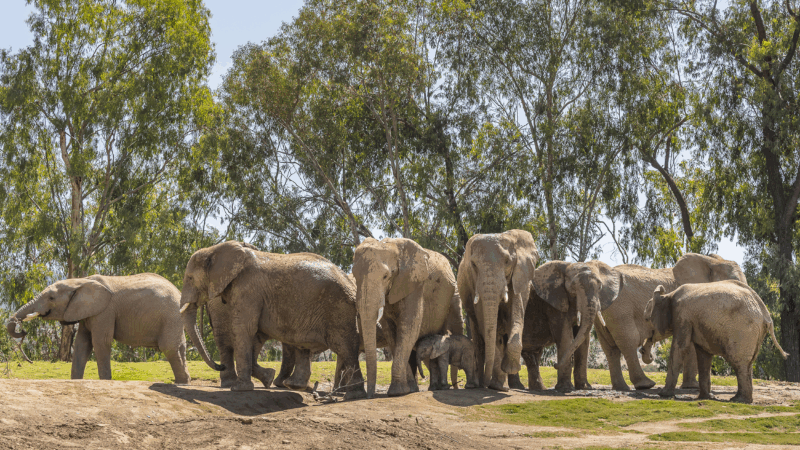When an earthquake struck San Diego, these elephants formed an ‘alert circle’
When a 5.2 magnitude earthquake hit Southern California on Monday, humans followed the usual drill: drop, cover and hold on.
But one herd of elephants at the San Diego Zoo Safari Park in Escondido, Calif. had their own plan — circle up and stand together.
Security footage from the park shows the moment clearly. One minute the elephants were basking in the sun; the next, they were reacting as the ground began to shake.
The three adult females scanned their surroundings and quickly banded together, forming a tight circle around two 7-year-old calves named Zuli and Mkhaya, according to the San Diego Zoo Wildlife Alliance.
Experts call this behavior an “alert circle,” a response matriarch elephants display when they perceive a threat.
“Elephants are highly social, they take care of each other,” says Joshua Plotnik, an associate professor of psychology at Hunter College in New York who studies elephant behavior.
Plotnik says this instinct to protect one another is at the core of the alert circle, a strategy for banding together when danger is near.
“They bunch together, the adults on the outside facing out, and then they’ll push the younger individuals into the middle,” he says.
Elephants can sense seismic vibrations through their feet and ears, Plotnik says, alerting them to potential danger. And earthquakes aren’t the only thing they can detect: Something similar happened during the 2006 Boxing Day Tsunami in southeast Asia, he recalls.
“I’ve heard anecdotes … of elephants responding prior to the large tsunami waves reaching the shores of Thailand, for instance, of elephants retreating up to higher ground with other elephants.”
These fast, coordinated responses reveal the complex social nature of elephants, Plotnik says. But he warns that elephants’ survival in today’s world requires more than just instinct; there’s still much we don’t understand about how they interpret threats.
Learning more, he says, is key to protecting these endangered animals.
“The Asian and African elephants are in imminent danger of going extinct, and it’s crucially important that we continue to learn more about their behavior and cognition if we’re going to come up with ways to protect them and conserve them in the wild,” Plotnik says.
Lindsey Vonn says she suffered ‘complex tibia fracture’ in her Olympic downhill crash
The 41-year-old star said her torn ACL was not a factor in her crash. "While yesterday did not end the way I had hoped, and despite the intense physical pain it caused, I have no regrets," she wrote.
Guerilla Toss embrace the ‘weird’ on new album
On You're Weird Now, the band leans into difference with help from producer Stephen Malkmus.
Nancy Guthrie search enters its second week as a purported deadline looms
"This is very valuable to us, and we will pay," Savannah Guthrie said in a new video message, seeking to communicate with people who say they're holding her mother.
Immigration courts fast-track hearings for Somali asylum claims
Their lawyers fear the notices are merely the first step toward the removal without due process of Somali asylum applicants in the country.
Ilia Malinin’s Olympic backflip made history. But he’s not the first to do it
U.S. figure skating phenom Ilia Malinin did a backflip in his Olympic debut, and another the next day. The controversial move was banned from competition for decades until 2024.
‘Dizzy’ author recounts a decade of being marooned by chronic illness
Rachel Weaver worked for the Forest Service in Alaska where she scaled towering trees to study nature. But in 2006, she woke up and felt like she was being spun in a hurricane. Her memoir is Dizzy.






